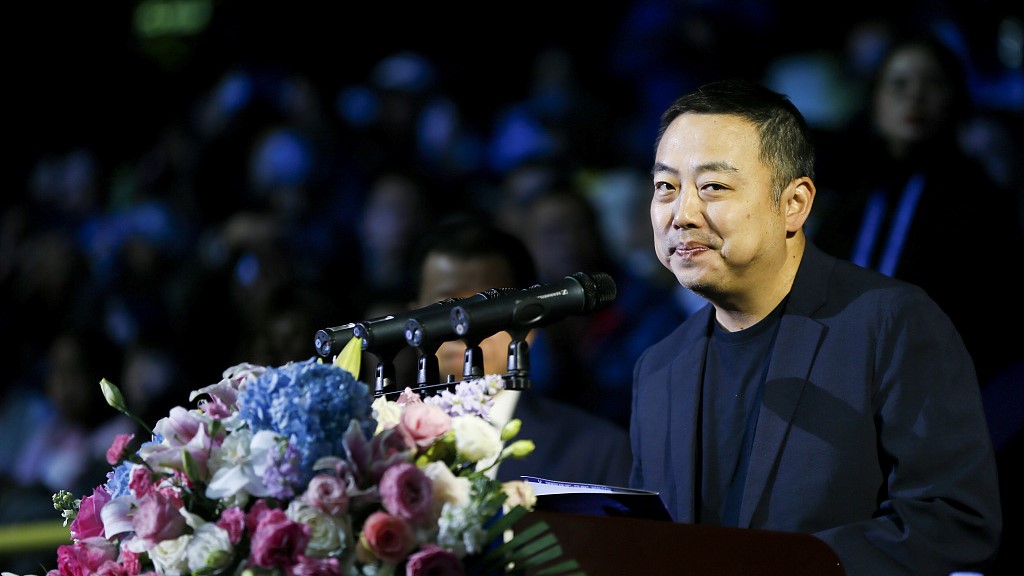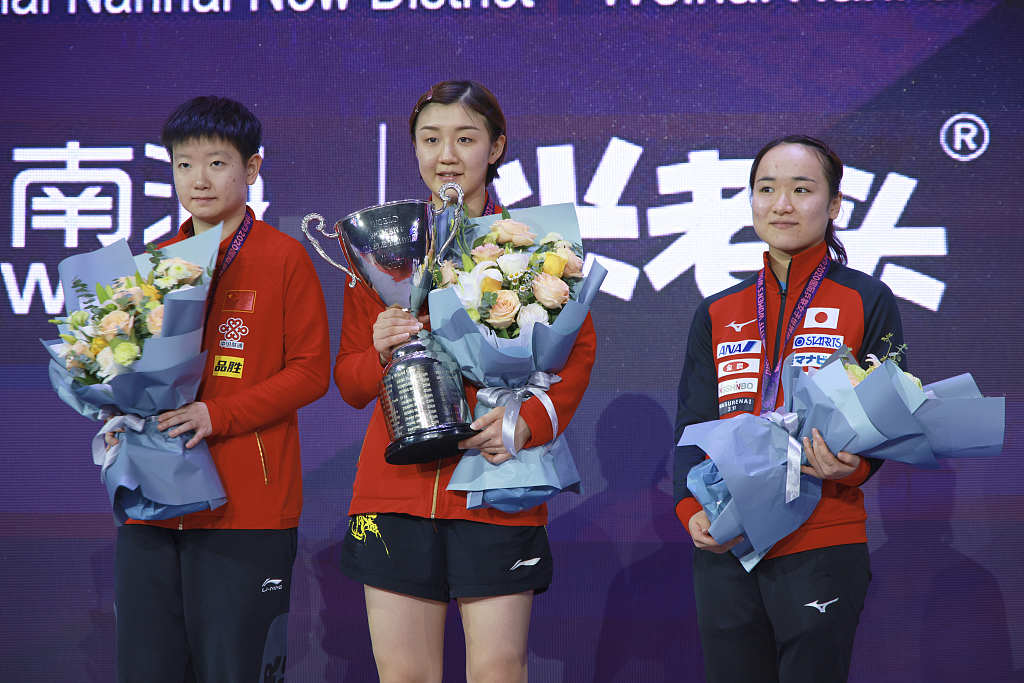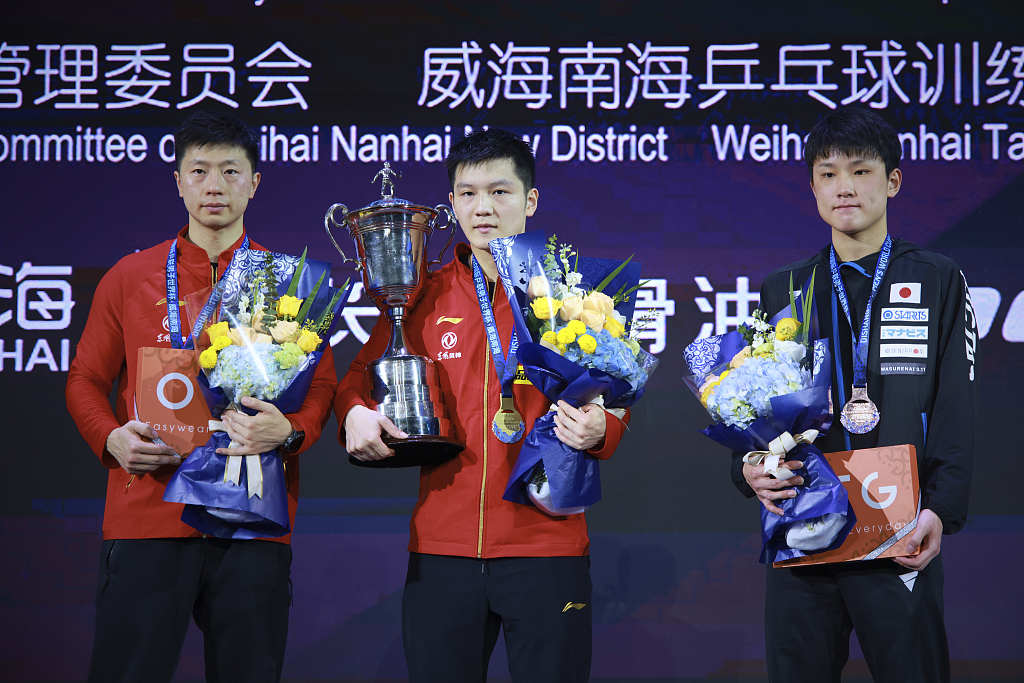
Liu Guoliang, president of the Chinese Table Tennis Association (CTTA) and head of the World Table Tennis (WTT). /CFP
Liu Guoliang, president of the Chinese Table Tennis Association (CTTA) and head of the World Table Tennis (WTT). /CFP
"We will do everything we can to assist the development of table tennis around the world because that's what a country with a strong table tennis team and an open mindset do. They saw it, and we did it this time," said Liu Guoliang, president of the Chinese Table Tennis Association (CTTA) and head of the World Table Tennis (WTT).
International table tennis competition returned to China in the form of ITTF Men's and Women's World Cup, as well as the ITTF Finals after being halted for months by the COVID-19 pandemic. As an icon of the sport both in China and in the world, Liu revealed some interesting details behind the curtain in an interview with Sina Sports. Here are some excerpts of that interview.

From L to R: Sun Yingsha, Chen Meng of China and Mima Ito of Japan pose for a photo wearing their medals at ITTF Women's World Cup in Weihai, east China's Shandong Province, November 10, 2020. /CFP
From L to R: Sun Yingsha, Chen Meng of China and Mima Ito of Japan pose for a photo wearing their medals at ITTF Women's World Cup in Weihai, east China's Shandong Province, November 10, 2020. /CFP
Q: The ITTF Finals was the first international sports event that allowed attendance in China since the pandemic broke. What made China the host?
A: The pandemic hit sports hard. The (ITTF) World Championships, the Olympics, they were all gone. The ITTF wanted to find a safe place where athletes, coaches, and working staff could be quarantined and tested before the contest could happen in a bubble. This bubble will put everything behind closed doors to prevent the spreading of the coronavirus. Many places were considered until China was confirmed the safest option. It's great news to every table tennis player and every fan of the sport.
No matter how hard the pandemic hit, China did the world's best job against it. Table tennis needs competitions to happen. When the rest of the world meets difficulty, China as a major country and the CTTA as the ITTF's biggest member should take the responsibility of hosting competitions. We are totally capable of doing it too.

From L to R: Ma Long, Fan Zhendong of China, and Tomokazu Harimoto of Japan pose for a photo wearing their medals at ITTF Men's World Cup in Weihai, November 15, 2020. /CFP
From L to R: Ma Long, Fan Zhendong of China, and Tomokazu Harimoto of Japan pose for a photo wearing their medals at ITTF Men's World Cup in Weihai, November 15, 2020. /CFP
Q: The pandemic is still spreading around the world, how did you assure foreign athletes that its safe to attend the event in China?
A: We required that everyone coming to China from overseas finish a 14-day quarantine first for safety of both the public and the event. At the beginning, some athletes understandably did not like it because they did not have the quarantine policy back at home. We told them that it's about safety, not what they wanted. Besides, it's for their own good. We also told them that they would receive nucleic acid test after three-day quarantine in Shanghai and then they would be transferred to our base in a closed way. In another eight days, they could hit balls for training and practice.
That's what got the players. Besides, we invested our best efforts in every detail of our service. For example, athletes will get food cooked based on their own dietary habits. Mima Ito of Japan was the first to ask for a table in her room so she could practice every day. We then found her one and put it in her room. In the following days, foreign athletes told us that China's epidemic prevention's was as decent as I said. Their doubt and worries were gone, replaced by acceptance and gratefulness.

Ma Long of China lifts men's singles championship trophy after defeating his compatriot Fan Zhendong in the ITTF Finals in Zhengzhou, central China's Henan Province, November 22, 2020. /CFP
Ma Long of China lifts men's singles championship trophy after defeating his compatriot Fan Zhendong in the ITTF Finals in Zhengzhou, central China's Henan Province, November 22, 2020. /CFP
Q: Audience were allowed to attend the ITTF Finals. What did that mean to the competition?
A: First, it was the athletes that returned, then it was the audience. No matter how well athletes performed, they still need attention and support from fans. Sport is both interactive and connective. When fans cheer for athletes at the scene, it's also a display of excitement and willpower.
Q: What other special meaning does it have for international table tennis events to return in China?
A: These competitions were not just sports events, they were also a window China opened to the rest of the world, through which everyone could see my country's efforts and progress in fighting the coronavirus. Over 100 people from 27 countries and regions have seen it and they will show it in their words and acts to all the table tennis fans in the world, like a signal being sent. I believe other sports can learn from table tennis. Everyone is learning how to do it through trial and error, including the organizers of the Tokyo Olympics. Someone has to be the pioneer and we just did it.

